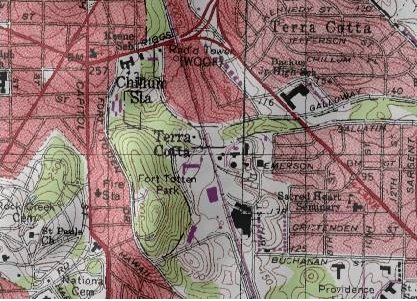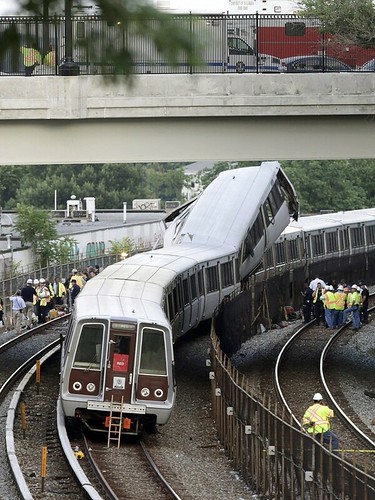Talking a lot, but not really saying anything
(with apologies to the Talking Heads, remembering that I didn't go see them in a small student theater on campus, probably fewer than 400 people capacity, in maybe October 1978, because I thought writing a paper was more important...)
Today's Post has an op-ed by a former Post writer about the need to have dedicated funding sources for WMATA, that the lack of this has likely contributed to whatever the failures were that led to the terrible crash two days ago, a crash which killed 9 people and injured scores more, ironically in a place where a train crash about 100 years ago killed 38 people. See "A Metro Issue to Weigh: The Price of Parsimony."

Terra Cotta Station on an old USGS map, date unknown.
As important as dedicated funding is, see for example this report from the Brookings Institution, Washington's Metro: Deficits by Design, the issues go much deeper.
The primary reason that I have been writing a lot less (this blog has been known for prodigious posting and long entries) for the past few months (besides work responsibilities, house responsibilities, and a bit of a life outside land use and transportation and good government and civic engagement concerns, not to mention a laptop riven with viruses so I don't take it with me too often when I travel these days) is that I am "depressed" about the state of things in the city. I am astounded at the meagre level of discourse and thinking, the quality of our democracy, the striving for mediocrity, the failure to be able to think and execute with vision.
Having just been for a few days to Smith Island on the Chesapeake Bay, staying in a town, Tylerton, now with about 50 residents, and only reachable by boat, makes me think even more about how failure to make the right decisions can have terrible consequences--the pollution of the Chesapeake by man's transgressions has destroyed much of the oyster and crab population, and the land and marshes abutting the bay continues to erode.
And as an article in the Post said a couple weeks ago, "East Coast May Feel Rise in Sea Levels the Most," places like Dorchester County could be half under water in 20+ years (which makes me realize how these kinds of issues need to be incorporated better into the planning work I do--it's something I missed when working on a commercial district revitalization framework plan for Cambridge earlier this year).

Herons, geese and other birds, Chesapeake Bay, off Smith Island (this was in Virginia; the southern most part of the Island, and the Delmarva Peninsula, is Virginia territory). We reached this area by boat.
On the local WashDC_Metro e-list, someone wrote about how the WMATA Board needs to take responsibility, has responsibility for what happened, and that people should resign.
I do think that the board, consisting of political appointees from the various jurisdictions, must be more professionalized. It can't be a bunch of hacks making very short term decisions, with a severe political calculus. We may never know why, but people died, and I have to believe that at least in part, this was the consequence of management and leadership failures, both within the operational side of the transit system, as well as in the leadership and oversight of the system. (And yes, maybe we need railroad people, not bus people, to run the railroad system of the transit system.)
I think a lot about systems, processes, and structures (one of the most important books I ever read was the Social Psychology of Organizations, and for a brief time I did a bit of work with Ronald Lippitt, one of the founders of the field of organizational development, allegedly he coined the term). Basically, if you get the systems and processes right, you should generate the right outcomes. And, while I haven't read this book, Computer-Related Risks, I used to read the column by the author that appeared monthly back in the journal Communications of the Association of Computer Machinery.
Computer-Related Risks is much more than a collection of computer mishaps; it is a serious, technically oriented book written by one of the world's leading experts on computer risks. Computer-Related Risks summarizes many real events involving computer technologies and the people who depend on those technologies, with widely ranging caused and effects. It considers problems attributable to hardware, software, people, and natural causes. Examples include disasters (such as the Black Hawk helicopter and Iranian Airbus shootdowns, the Exxon Valdez, and various transportation accidents); malicious hacker attacks; outages of telephone systems ad computer networks; financial losses; and many other strange happenstances (squirrels downing power grids, and April Fool's Day pranks). Computer-Related Risks addresses problems involving reliability, safety, security, privacy, and human well-being. It includes analyses of why these cases happened and discussions of what might be done to avoid recurrences of similar events.
All the outcome failures I write about have to do with flawed systems. And our region is flawed.
Some time ago, I suggested that the WMATA board members be elected. In "Accountability Systems" from November 2007, I wrote:
In the Sunday Post, two letter writers, in "A Few Fare Questions For Metro," pose some questions. I don't agree that Congressional investigation is the answer. Tom Davis has hardly shown himself to be reasonably able on transit questions, even if he has put forth legislation to provide additional federal funding. But their point about accountability and connectedness is worth thinking about.
As long as the WMATA board is somewhat insulated from the citizenry, because board members are appointed by the jurisdictions, with Maryland's appointments made by the Governor, yet another level beyond the purview of MontCo and PG, especially because for the most part people appointed to these kinds of boards don't use transit (this isn't NYC), there will be a disconnect between transit users and the transit system.
Not only are the board members, maybe other than those from Arlington County, not likely to use transit in the DC region, they might not even be inclined to ride transit when they travel to other places, further limiting their understanding and awareness.
In the past I suggested that maybe the WMATA board should be elected. OTOH, locally elected representatives may not be connected to the funding streams from government, which would be a different and undesired disconnect as well.
Still, there may need to be some directly elected representation on the WMATA board, to increase connectedness to the citizenry, if not accountability. In other areas, transit taxes are voted on by the electorate (San Francisco Bay, etc.). Again, voting on issues like this would increase awareness and connectedness.
---------------------------------------------------------------
Someone else countered that because of the fact that WMATA is funded in part by annual contributions by the three jurisdictions, that the board needs to be tightly coupled with those jurisdictions, with the people making budget decisions. I see their point. Furthermore, it's not like we have great examples from elsewhere about a more open system for selecting WMATA board members.
But it's not working at least at some level, despite record ridership. And focusing on the need for dedicated funding is important, but not the only problem, and in fact, it is the result of a broader and deeper problem, in how the regional system was conceptualized and how it is managed and how it is led.

People work at the scene where two transit trains were involved in a crash in Washington June 22, 2009. Two Washington, D.C., subway trains collided during the Monday afternoon rush hour, killing four people and injuring 70 in a mass of tangled metal. REUTERS/Yuri Gripas (UNITED STATES TRANSPORT SOCIETY)
Decisions and failure to lead, have consequences.
Labels: change-innovation-transformation, civic engagement, electoral politics, electoral politics and influence, progressive urban political agenda, transportation planning



0 Comments:
Post a Comment
<< Home